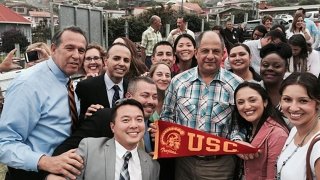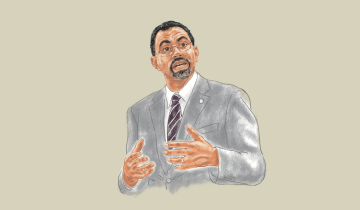USC Rossier is committed to improving learning in urban education locally, nationally and globally. This week, as the USC Global Conference 2015 is underway in Shanghai, China, we are focusing on what it means to study education with a global lens. For one Rossier professor, to study global education means to experience it firsthand. For the past three years, he has helmed a summer program that gives EdD students the opportunity to conduct research internationally.
After Professor of Clinical Education Mike Escalante took his first group of students out of the country, on a trip to China several years ago, he was determined to repeat the experience. “That trip changed my life,” he said. “It helped me to understand where we as Americans fit in our relationship to the world. I started to think: Can I take that incredible opportunity to conduct international research and blend it with the doctoral dissertation experience?”
From there, the Costa Rica trip was born. In the summer of 2013, Escalante led the inaugural group of EdD students to Costa Rica to study the impact of globalization on the country’s education system. They studied the burgeoning relationship between Intel and Costa Rican schools. A second group flew down in 2014, focusing on the kids involved in the Intel-sponsored STEM science fair.
“Going abroad for my EdD research allowed me to gain a global perspective.”
—EdD student Denise Harshman
In June of 2015, the third group of EdD students built upon the work of their predecessors by concentrating on the relationship between school leadership and student performance. The USC Rossier students met with business leaders, government workers, teachers and education administrators to gather data explaining why some Costa Rican schools perform better than others. Due to the success of the previous two trips, this year’s trip was officially supported by the Costa Rican Ministry of Education and Ministry of Science, Technology, and Telecommunications. The visit culminated in a meeting with Costa Rica President Luis Guillermo Solís.

“Going abroad for my EdD research allowed me to gain a global perspective,” said student Denise Harshman. “Knowing what is possible and occurring in other countries broadened my view of what students are capable of accomplishing—and how and what is needed to achieve it.”
Escalante selected Costa Rica both because the country places a particularly high emphasis on the importance of education and because it has a rapidly developing economy, making it a perfect case study for students examining the intersections between global economics and education. “Costa Rica has done away with their military to provide more funding for schools,” Escalante explained. “That’s huge. They understand that in order to transform a country’s economy from primarily agrarian to more technology-focused, you have to have students graduating with 21st-century skills.”
“The goal of these research trips is for our students to more fully understand how we as educators can best prepare our students for competition in a global economy.”
—Mike Escalante, professor of clinical education
These lessons aren’t lost on the EdD students from Rossier. “It is important to look beyond the excuses and help shift the thinking about the future of our students,” added Harshman. “The competition for jobs is not in our backyard, but around the globe.”
Fueled by positive feedback from both the EdD students and partners in Costa Rica, Escalante already has his sights set on next year’s trip. In 2016, the destination will be Ireland, yet another country that has much to teach EdD students about how schools adapt with a society transitioning from an agrarian economy to high tech.
“The goal of these research trips is for our students to more fully understand how we as educators can best prepare our students for competition in a global economy,” said Escalante. “There aren’t many doctoral programs I can think of providing this type of experience. I’m looking forward to another great trip.”




